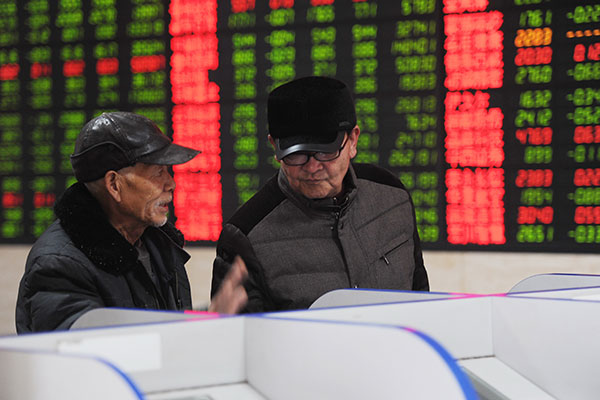
Investors check stock prices at a brokerage in Fuyang, Anhui province.[Photo by Wang Biao/China Daily]
A shaky stock market and stricter regulations have tested the wisdom of China’s private funds this year, and some of them are expected to shutter, leaving the survivors with potential for high-quality growth, analysts said.
Since August, the expansion of China’s privately-offered funds has obviously slowed.
According to the Asset Management Association of China, total assets under management, or AUM, of the sector as at the end of November were valued at 12.79 trillion yuan ($1.85 trillion), a tad higher than four months earlier.
Meanwhile, the number of private funds rose a bit to 75,220, while the number of industry practitioners edged down marginally to 245,500, AMAC data showed.
Data also showed that the market’s cooling followed rapid growth in 2017 and 2016, when the AUM were up 40.7 percent and 94.8 percent year-on-year, respectively.
“This year’s falling A-share market has forced many private funds trading securities to liquidate, as their values fell below the stop-loss line,” said Xu Shizhen, head of investment research at ZiAsset Financial Service, a Shenzhen-based investment adviser for more than 2,000 private funds firms.
The benchmark Shanghai Composite Index has dropped by more than 20 percent this year. As at the end of November, the value of private funds trading securities has edged down for 10 straight months to 2.26 trillion yuan, according to the AMAC.
Besides the stock market downturn, the country’s new regulatory rules on asset management were the other major drag on the expansion of private funds trading securities, according to Zhang Xia, chief strategy analyst at China Merchants Securities.
Since late 2017, financial regulators have rolled out a series of rules to address risks of the asset management sector. To meet the new requirements, many banks have stopped investing their wealth management products in private funds.
Tightened regulations also weighed on the growth of private equity funds and venture capital funds, which invest in unlisted companies, according to Zero2IPO Research, which focuses on China’s private equity and venture capital industry.
Combined value of PE and VC funds in China reached 8.57 trillion yuan on Nov 30, up only 0.8 percent month-on-month, accounting for 67 percent of the total value of private funds, AMAC data showed.
“After the PE/VC industry boomed and achieved the current scale in China, it is natural to see a slower industry expansion,” according to Zero2IPO Research.
The slackening expansion in the PE/VC industry could also be attributed to difficulties in raising capital, which in turn was a result of this year’s slower economic growth and deleveraging moves, it said.
In face of fewer fund resources, leading firms are leveraging their reputation to continue to raise money, squeezing some smaller ones out, it said.
The current unfavorable market environment is picking out strong private funds and knocking out weak players, underpinning the expected high-quality growth of the industry in the future, Xu said.
Xu is optimistic about the long-term prospects of private funds trading securities. For, regulators in December announced rules that allow wealth management subsidiaries of banks to cooperate with private funds. They also eased restrictions on the trading of stock index futures, a hedging instrument frequently used by private funds.
According to Zero2IPO Research, fundraising difficulties faced by the PE/VC industry may continue in 2019.
The science and technology innovation board, however, will provide more channels for exiting investments and, therefore, would likely boost investor interest in the industry, it said.
The PE/VC industry in China is still nascent but its prospects are promising, it said.
“The industry will continue to play an important role in supporting innovation-orientated enterprises, especially those in the sectors of information technology, internet and biomedicine.”
